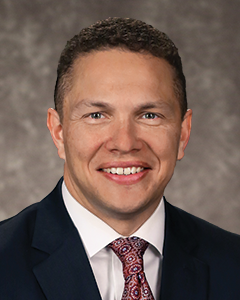When Missouri and Clay, Platte and Ray counties issued stay-at-home-orders and the Centers for Medicare & Medicaid Services expanded coverage for telehealth visits due to the COVID-19 pandemic, Meritas Health was at the ready. Clinics began offering virtual visits March 24, and by May 31 its 22 primary care and specialty practices had provided more than 12,300 virtual visits, mitigating exposure for sick and at-risk patients while protecting healthcare workers and the community.
Randall S. Cramer, DO, a family medicine physician with Meritas Health Landmark, is an early adopter. “Having government approval and insurance carriers following suit helped, but I wanted to provide virtual visits,” he said.
Screening and Reduced Risk
At the time, it was too early for his clinic to be set up for testing. “If patients felt they had symptoms, I could screen them and direct them to a COVID-19 testing location if they fit the criteria,” Dr. Cramer said.
He also sought to help patients avoid potential exposures. “My elderly patients continue to benefit greatly, but certainly everyone has someone who they are trying to prevent from getting sick,” Dr. Cramer said. “With virtual visits, I can provide care to anyone who wants to avoid the risk of exposure. Visits run the range of issues, just like in my office setting, and I still can arrange lab draws if needed.”
Patient Satisfaction
A recent study on behalf of Kyruss shows patients have been satisfied with virtual care during the pandemic and want greater access. An independent research firm surveyed 1,000 patients who accessed care virtually during the pandemic.
Published in Patient Perspectives on Virtual Care, the online survey focused on awareness and access, care experience, and follow-up and future interest. All respondents had at least one virtual visit between February and May and represented an equal mix from four age groups (18-34, 35-49, 50-64, and 65+ years).
Researchers found:
- 72% had their first virtual care visit ever during the pandemic, with over 75% saying they were very satisfied with their experience
- 74% wanted virtual care to be a standard part of their care moving forward; 50% stated they’d switch providers for the offering
- 30% scheduled their virtual visit online, but more than 50% would prefer this booking method in the future
Flexibility
Patients call his office to schedule virtual visits and get logon instructions, and his nurse performs intakes via phone ahead of time. At their scheduled virtual visit appointment, patients check in via a secure online portal and await Dr. Cramer’s arrival. “When I log in, I can see how long a patient has waited, but patients can be at home or work,” Dr. Cramer added.
It’s been a very positive experience for Dr. Cramer and his patients. “It feels like getting together with a good friend, yet there is a level of respect with one another,” he said. “Once this is over, I hope to continue. This is a great option and benefit for our patients.”

Randall S. Cramer, DO
Dr. Cramer earned his medical degree from Midwestern University’s Arizona College of Osteopathic Medicine. He completed his residency in family medicine at Memorial Hospital of South Bend.